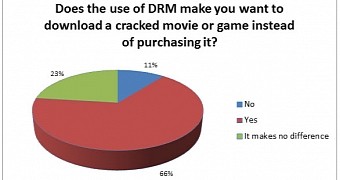The dispute regarding software piracy has been done to death, but unfortunately, there are still some undeniable points that video game publishers fail to address.
The way the situation currently is, it's sometimes easier to get cracked copies of video games to play, even when you actually own the original product. For the sake of the this conversation, I'm not going to discuss the monetary disparity between various social strata or geographic regions.
The fact that the experience of the law-abiding user is worse than the one of the user turning to torrents is something that video game publishers should really consider. When you make it difficult for people to do something, they will find workarounds.
It's been pretty much proven that, when given the chance, people who can afford to buy legitimate entertainment choose to do so. The fact that everyone steals the "Game of Thrones" television series is not the fault of the user but that of HBO, a company that refuses to make it easy to buy and stream it from wherever.
It's unpardonable for a private company to attempt to coerce the world into doing things its way, and expect that the private agents working in the free market not attempt to eschew its coercion.
In the case of digital goods, rampant piracy is the first sign that you're doing something wrong. It's not an indicator of the fact that people are generally scum, as many tend to believe.
The Internet is all-reaching, and when your business model relies on making it difficult for those who want to give you money and then enjoy hassle-free entertainment to do so, you shouldn't feel bad about dealing with piracy, which people turn to because it's simply easier than putting up with you. It's as simple as that.
A little common sense goes a long way, and companies should be pushing for wide access to entertainment, instead of walling it off just so their shareholders gain a false sense of security.
Case in point
You can head up to Steam and check out the backlash against DRM. Steam, Valve's digital distribution service, is in itself a form of DRM, but people tolerate it due to the fact that it also adds something of value, instead of merely locking up the products you have already paid for.
Some very obvious examples are Stardock's Sins of a Solar Empire: Rebellion and Rockstar's Max Payne 3, both released back in 2012, both of them great games, both of them facing some of the same issues.
Customers who bought the two games had to register them through each of their developers' websites, and many were unable to do so due to the fact that the websites were down. This is an atrocious and heinous crime against humanity, and I just won't stand for it.
The need to register a video game is understandable when you buy copies out in the wild, from shadowy sales men pulling them out of their stolen watches-laden trench coats, but when you buy them from Steam, it's just preposterous to also have to go through that.
These are the same issues faced by gamers when Games For Windows Live went under, causing a ton of games to misbehave, which is again unpardonable by any standards of decency, especially when you're talking about single-player games that have no reason to expire, ever.
Now, when you think about the fact that you can easily obtain both games illicitly, without having to endure any of the hassles of registering them, doesn't it make it seem just a little bit counter-productive?
Stealing is supposed to be actively discouraged, and the premier way to ensure this is to make sure that, when someone gives you money, they don't have any reasons to be sorry about it. Furthermore, when someone who chooses to just copy your game has it easier, you're basically providing an incentive for that.
Furthermore, when you think about Ubisoft's games, especially in the case of Watch Dogs, which was unplayable for days for legitimate owners, many of which resorted to downloading a cracked copy of the game in order to be able to enjoy it, it simply doesn't make sense.
If buying the entertainment you want to consume is considered something normal, why isn't treating customers with respect part of the deal? Don't punish me for giving you my money, when I can just download the game, movie or whatever and enjoy it hassle-free.
The solution isn't increased control over what gets shared on the Internet, further regulations, taking down torrent sharing websites, and so on, but improving the quality of the services offered by publishers, and maybe raising our standards a little bit and making a fuss about stuff like this when the situation calls for it.

 14 DAY TRIAL //
14 DAY TRIAL //